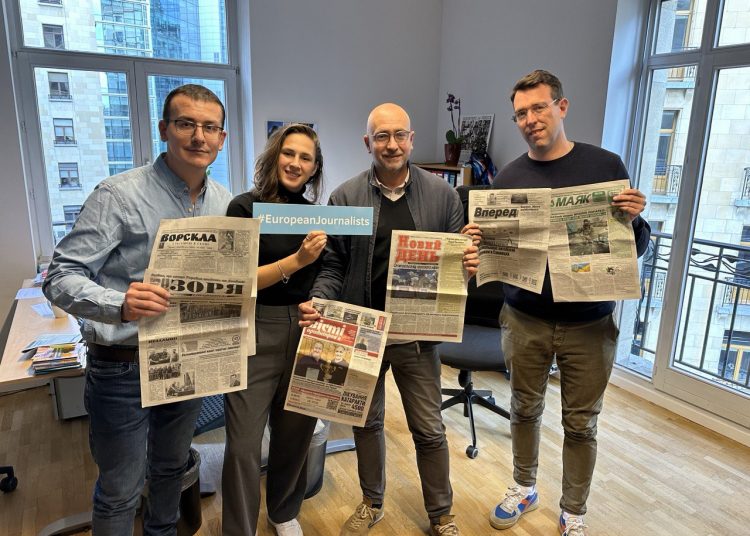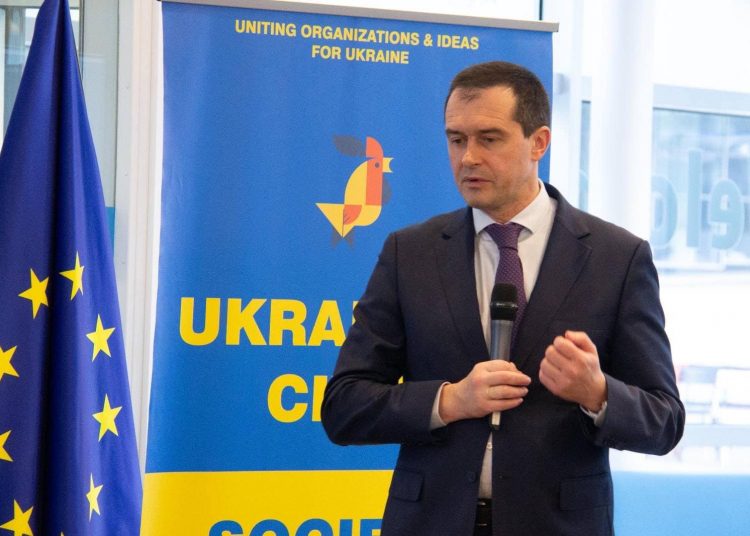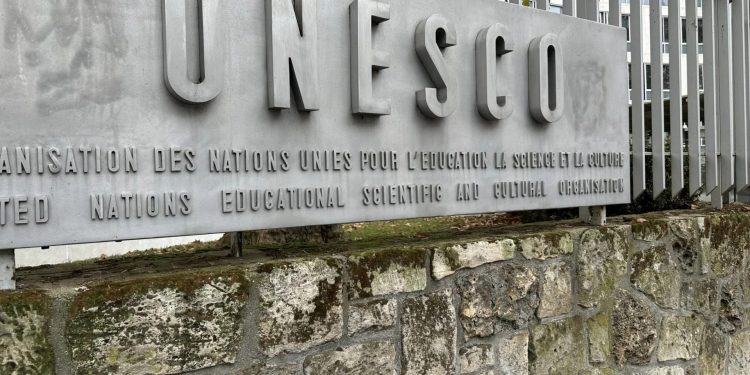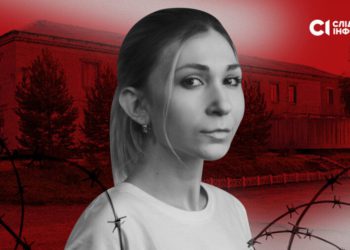The National Union of Journalists of Ukraine (NUJU) held photo exhibitions in Paris and Brussels
‘These photos are a very apt way to learn the real story about the war, the Ukrainian people, and our struggle. After all, Russia uses lies as a weapon in this war’, said Ambassador Extraordinary and Plenipotentiary, representative of Ukraine to the European Union Vsevolod Chentsov at the opening of the exhibition in Brussels, prepared by the European Federation of Journalists (EFJ) and NUJU.
According to the diplomat, professionally taken photos help convey to the world information about what the russian federation is doing in Ukraine. ‘It is very important that for the exhibition in Brussels the Ukrainian Public Hub was chosen. It’s a place where we present Ukraine to Europe and tell stories about Ukraine,’ added Vsevolod Chentsov. ‘Unfortunately, in this war we are losing our best people who are giving their lives in the fight against russian imperialism.’
The exhibition is devoted to the realities of the russian-Ukrainian war and the work of journalists in dangerous conditions. This exposition is part of the initiative of the NUJU to organize an international tribunal against Russia for war crimes.
The Representative Office of Ukraine to the European Union called the opening of the exhibition an “inspiring event”, ‘When we viewed the powerful photos and videos that demonstrate the work of these journalists, we were reminded of the sacrifices they make to bring us the truth even in the most difficult and dangerous circumstances. Their relentless pursuit of justice and unwavering commitment to the truth are both humbling and inspiring.’

NUJU President Sergiy Tomilenko emphasized that today russia is making great efforts to erase references to the war in Ukraine from the media and to divert people’s attention to other issues. The russian occupiers see the destruction of independent journalism in Ukraine (where possible for them) and the physical extermination of journalists as one of the ways to achieve their goal.
More than 70 media workers died during the full-scale war. These are both civilian victims of aggression and journalists-warriors mobilized to the Defense Forces of Ukraine. 16 of these journalists turned heads while performing professional duties. ‘Our exhibition is a tribute to the dead and at the same time a call to punish russia for war crimes,’ said the NUJU leader.
The photos presented in the exhibition reflect events in various cities and regions of Ukraine: Bucha, Borodyanka, Chernihiv, Uman, Dnipro, Kherson region, Orihiv and Zaporizhia region, Izium and Kharkiv region, Mariupol, Lyman, Bakhmut, Kramatorsk and Donetsk region.
In one of the photos, residents of front-line Orikhiv embrace Svitlana Karpenko, the editor of the local newspaper Trudova Slava, who brought copies of her publication to them. In the frontline areas, where there is often no electricity and mobile communication, the printed press becomes almost the only means of information. With the assistance of the National Union of Journalists of Ukraine, it was possible to restore the printing of three dozen front-line local newspapers.
The exhibition presents 26 photographs, including, in particular, the works of famous Ukrainian military photographers Kostyantyn and Vlada Liberovy (LIBKOS), Yan Dobronosov, Pulitzer Prize and World Press Photo Laureate Evgeniy Maloletka, photographer of the Associated Press news agency in Ukraine Yefrem Lukatsky and others.
The opening of the exhibitions in Paris and Brussels was attended by representatives of the French media, in particular, colleagues of the French journalists Frédéric Leclerc-Imhoff and Armand Soldin, who were killed in Ukraine, leaders of journalists’ unions and members of the EFJ Executive Committee.
At official events, a video was shown about aspects of journalistic activity during the russian-Ukrainian war and how NUJU helps Ukrainian and international media in their work on the front lines.
During the opening of the exhibition in Paris, representatives of the Group of Social Security of Mass Media and Communications from France emphasized that the presented exhibition is a tribute to journalists who inform the world, risking their lives.
Guilherme Canela, Chief of the UNESCO Section for Freedom of Expression and Safety of Journalists, spoke about the participation of this international organization in supporting Ukrainian journalists and mass media, UNESCO’s role in the fight against actual impunity for war crimes. ‘It is impossible to fight impunity if crimes are not documented. Therefore, we need images, accurate documents, and information from investigative journalists, law enforcement officers, and forensic experts. We should work on this today,’ Guilherme Canela outlined.
This opinion was developed by EFJ General Secretary Ricardo Gutiérrez, ‘We need evidence about this war, and we need to document war crimes! And journalists play a fundamental role in this. Thanks to everyone who supports journalists on the ground: IFJ, EFJ, UNESCO, as well as Fondation Hirondelle, and many others.’
The importance of the work of brave Ukrainian journalists was emphasized by EFJ President Maya Sever, ‘In a world where conflicts are raging in different corners of the globe (currently we have witnessed the horrors unfolding in the Middle East), you and your colleagues, who took photos and stories represented at the exhibition, you make sure that the suffering of Ukrainians is not forgotten.’ She also thanked her Ukrainian colleagues ‘for strength, love and courage in bringing the truth to the world.’
The leaders of the French trade union of journalists, the President of the International Federation of Journalists (IFJ) Dominique Pradalié and the Head of Campaigns and Communications Department and Gender expert of the IFJ Pamela Morinière, representatives of the newspaper Le Figaro and Agence France-Presse spoke at the opening of the exhibitions. The latter presented NUJU with an almanac in memory of journalist Arman Soldin, who died in Ukraine.

A short video presentation of the war photo exhibition in Paris and Brussels can be viewed at https://www.youtube.com/watch?v=az6NjfR5tsg.
While in France, NUJU President Sergiy Tomilenko also took part in the meeting of the Executive Committee of the European Federation of Journalists. ‘The civilized world shows solidarity with Ukraine, including allocating resources to support the humanitarian and information spheres,’ Tomilenko noted. ‘Our task is that this aid contributes to the survival of the Ukrainian press and its stable work in the conditions of war. Whether millions of Ukrainians will be able to receive vital information depends on this.’
The material was prepared with the support of the Project ‘Improving Ukrainian Media Resilience in Ukraine’. It’s implemented by Fondation Hirondelle (Switzerland) and IRMI, the Institute of Regional Media and Information (Ukraine). Funded by Swiss Solidarity Foundation.
NUJU Information Service

 THE NATIONAL UNION OF
JOURNALISTS OF UKRAINE
THE NATIONAL UNION OF
JOURNALISTS OF UKRAINE
















Discussion about this post